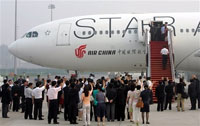Hundreds of Chinese tourists fly to Taiwan
Hundreds of Chinese tourists flew into Taiwan Friday in the first wave of regular cross-straits commercial flights in nearly six decades that could transform ties between the old foes.

The first flight, a China Southern Airlines plane carrying 230 passengers, touched down at Taoyuan International Airport in northern Taiwan, and fire trucks shot water at it in a welcome gesture.
"From today onward, regular commercial flights will replace the rumbling warplanes over the skies of the Taiwan Strait, and relations between the two sides will become better and better," pilot Liu Shaoyong said after the 90-minute flight from Guangzhou in southern China. Liu is also chairman of the Chinese airline.
Before boarding an Air China flight to Taiwan from Beijing, Shao Qiwei, head of China's Tourism Administration, said the regular flights will "build a bridge of friendship" with Taiwan's 23 million "hospitable compatriots."
"The start of mainland tourists ... will create a scenic route across the strait," Shao said at the Beijing airport, referring to the Taiwan Strait that separates the self-ruled island and its powerful communist neighbor, which still claims Taiwan as its territory.
Over 700 Chinese tourists flew into Taiwan on Friday, while five Taiwanese airlines carried hundreds of Taiwanese on nine charter flights in the opposite direction, to the Chinese cities of Beijing, Shanghai, Guangzhou and Xiamen.
Although Taiwan has allowed limited charter flights for holidays in recent years, the regular weekend service is a major step forward in normalizing travel between the rivals split amid civil war in 1949. Taiwan had barred direct travel to and from China for decades as a security measure, and most mainland tourists were also banned.
Since taking office in May, Taiwanese President Ma Ying-jeou has persuaded Beijing to put aside deep-seated political disputes to strive for peace and closer economic ties.
Mainland authorities agreed to the tourist flights in talks with Taiwan last month, apparently hoping the increased regular contacts could help push its goal of eventual unification.
The first stop for some of the tourists on weeklong package tours was at Taipei's grand Sun Yat-sen Memorial Hall, a red-tiled structure with a lotus-shaped roof and expansive gardens that honors a man revered both by people from both sides of the strait.
They posed for pictures and bowed to a statue of Sun flanked by two Taiwanese flags.
Sun led a revolution that overthrew China's last emperor and ushered in a republic in 1912. He was also the founder of Taiwan's ruling Nationalist Party, which was forced out of the mainland by the communists in 1949.
"I am very happy about my first visit to Taiwan," said 55-year-old real estate agent Wen Jianxin from Guangzhou. "I have found Taiwan's streets to be very clean and orderly. I am impressed."
To avoid any embarrassing scenes, Taiwanese officials have vowed to prevent any confrontations between the visitors and any anti-communist activists. Followers of Falun Gong, a group banned in China and strongly opposed to the Chinese government, ignored requests by the Tainan municipal government in southern Taiwan to stay away from several popular tourist sites.
Falun Gong, a spiritual movement rooted in Buddhism, Taoism and traditional Chinese beliefs, has been persecuted in China and Beijing banned it as an "evil cult" in 1999.
Taiwan hopes to eventually extend the weekend-only flights to a daily service to help turn the island into a transport hub in Asia as well as prop up the island's economy.
Thousands of Taiwanese have invested in China, setting up high-tech, textile and other factories to take advantage of lower labor costs. The regular flights - skipping the usual stopovers in other transit points - would allow them to save time and expenses in travel.
In recent weeks, Taiwan has taken a number of other initiatives that could help economic integration of the two sides, including currency exchanges with the mainland and easing control on mutual funds investing in China-listed stocks.
Subscribe to Pravda.Ru Telegram channel, Facebook, RSS!




